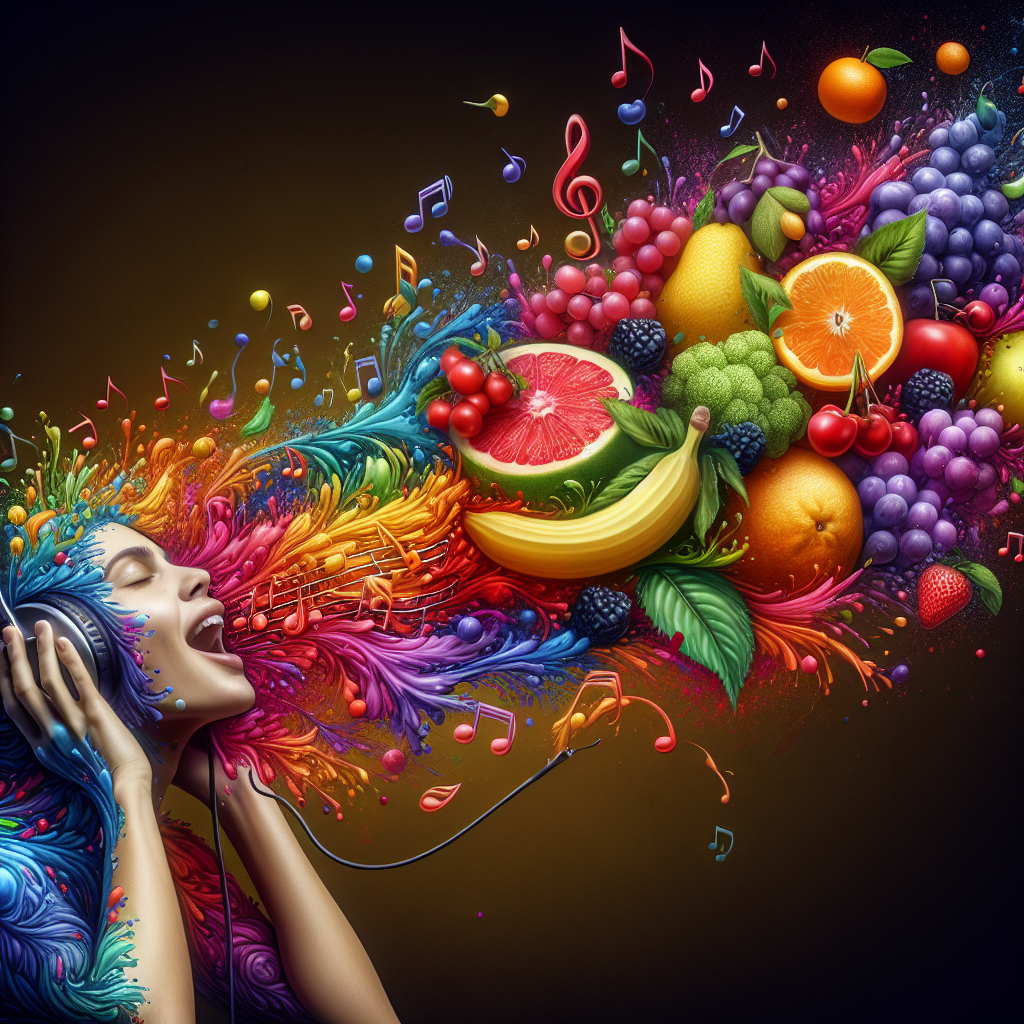How Vitamins Enhance Mood and Music Enjoyment

Discover how vitamins can enhance your mood and music enjoyment! Learn more about the amazing benefits of vitamins and how they can transform your daily life. Don’t wait, start your journey to a happier, healthier you today. Click here to find out more.
Exploring the Connection Between Vitamins, Mood Enhancement, and Music Enjoyment
The intricate relationship between vitamins, mood enhancement, and music enjoyment is a fascinating area of study that has been gaining traction in recent years. This connection is not as far-fetched as it may initially seem, as vitamins play a crucial role in maintaining our overall health, including our mental and emotional well-being. This, in turn, can significantly influence our capacity to enjoy music, an activity that is deeply intertwined with our emotional state.
Vitamins, particularly B-complex vitamins and vitamin D, have been linked to mood enhancement. B-complex vitamins, which include B1, B2, B3, B5, B6, B7, B9, and B12, are essential for the brain’s production of chemicals such as serotonin, dopamine, and epinephrine. These chemicals, often referred to as ‘feel-good’ hormones, are responsible for regulating our mood. A deficiency in these vitamins can lead to a decrease in the production of these hormones, potentially resulting in mood disorders such as depression and anxiety.
Vitamin D, on the other hand, is often referred to as the ‘sunshine vitamin’ because our bodies produce it when exposed to sunlight. Research has shown that vitamin D deficiency is associated with mood disorders, including depression and seasonal affective disorder. This is because vitamin D plays a crucial role in the brain’s function and development, including the production of serotonin.
Now, you may be wondering, how does this relate to music enjoyment? The answer lies in the profound connection between our mood and our ability to enjoy music. Music has a powerful impact on our emotions. It can uplift us when we’re feeling down, soothe us when we’re feeling anxious, and energize us when we’re feeling lethargic. However, our ability to experience these emotional responses to music can be significantly affected by our mood. When we’re feeling low or anxious, we may not be able to fully appreciate or enjoy the music we’re listening to.
By enhancing our mood, vitamins can indirectly enhance our music enjoyment. When we’re in a good mood, we’re more likely to be open and receptive to the emotional impact of music. We’re more likely to feel the joy, the sorrow, the excitement, the tranquility that the music is trying to convey. We’re more likely to be moved by the music, to be touched by its beauty, to be swept away by its power.
In conclusion, the connection between vitamins, mood enhancement, and music enjoyment is a testament to the holistic nature of our health. Our physical health, our mental health, our emotional health – they’re all interconnected. By taking care of our physical health through proper nutrition, including adequate intake of vitamins, we’re also taking care of our mental and emotional health. And by doing so, we’re enhancing our capacity to enjoy one of life’s greatest pleasures – music. So, the next time you’re feeling a little low, remember – a dose of vitamins and a dose of your favorite music might just be the pick-me-up you need.
The Role of Vitamins in Boosting Mood and Enhancing Music Experience

Vitamins play a crucial role in maintaining our overall health, but their impact extends beyond just physical well-being. Recent studies have shown that certain vitamins can significantly enhance mood and even amplify our enjoyment of music. This fascinating intersection of nutrition, psychology, and musicology offers a fresh perspective on how we can optimize our daily lives.
The connection between vitamins and mood enhancement is rooted in the complex biochemistry of the brain. Vitamins, particularly B-complex vitamins, are essential for the production of neurotransmitters, the brain chemicals that regulate mood. For instance, vitamins B6, B9, and B12 are involved in the synthesis of serotonin, a neurotransmitter often referred to as the ‘feel-good hormone’ due to its role in promoting feelings of happiness and well-being. A deficiency in these vitamins can lead to lower serotonin levels, which is associated with mood disorders such as depression and anxiety.
Vitamin D, often dubbed the ‘sunshine vitamin’, also plays a significant role in mood regulation. It is produced in the skin in response to sunlight and can also be obtained from certain foods and supplements. Research has shown that low levels of vitamin D are linked to mood disorders, including depression and seasonal affective disorder. By ensuring an adequate intake of these vitamins, we can support our brain’s production of mood-enhancing neurotransmitters, leading to a more positive outlook and improved mental health.
But how do vitamins enhance our music experience? The answer lies in the intricate relationship between mood and music perception. Music has a profound ability to evoke emotions, and our emotional state can, in turn, influence how we perceive and enjoy music. When we are in a positive mood, we are more likely to enjoy music and perceive it as more pleasant. Therefore, by boosting our mood, vitamins can indirectly enhance our music experience.
Moreover, certain vitamins may have a more direct impact on our music perception. For instance, research has suggested that the antioxidant properties of vitamin E may protect against age-related hearing loss, a common factor that can diminish music enjoyment. Similarly, vitamin A, which is essential for the health of the eyes and vision, may enhance visual aspects of music experiences, such as live performances or music videos.
In conclusion, vitamins play a vital role in boosting mood and enhancing music experience. By supporting the production of mood-regulating neurotransmitters, vitamins like B6, B9, B12, and D can promote a positive mood and indirectly enhance music enjoyment. Additionally, vitamins like E and A may directly improve music perception by protecting against hearing loss and supporting vision. Therefore, maintaining a balanced diet rich in these vitamins, or taking appropriate supplements, can be a simple yet effective way to enhance our mood and music experience.
However, it’s important to remember that while vitamins can contribute to mood enhancement and improved music enjoyment, they are just one piece of the puzzle. A holistic approach that includes a balanced diet, regular exercise, adequate sleep, and stress management is crucial for optimal mental health and well-being. As always, it’s recommended to consult with a healthcare professional before starting any new supplement regimen.
Unveiling the Impact of Vitamins on Emotional Well-being and Music Appreciation
The human body is a complex system that requires a variety of nutrients to function optimally. Among these nutrients, vitamins play a crucial role in maintaining our physical health. However, their impact extends beyond the physical realm, influencing our emotional well-being and even our appreciation of music. This article aims to unveil the fascinating impact of vitamins on emotional health and music enjoyment.
Vitamins, particularly B-complex vitamins, have been found to have a profound effect on our mood. These vitamins, which include B1, B3, B6, B9, and B12, are essential for the production of neurotransmitters, the chemicals that transmit signals in the brain. Neurotransmitters like serotonin, dopamine, and norepinephrine play a significant role in regulating mood. For instance, serotonin is often referred to as the ‘feel-good’ neurotransmitter because it contributes to feelings of well-being and happiness. Therefore, a deficiency in B vitamins can lead to a decrease in the production of these neurotransmitters, potentially leading to mood disorders such as depression and anxiety.
Moreover, research has shown that vitamin D, often referred to as the ‘sunshine vitamin’, can also influence mood. This vitamin is unique because it can be synthesized in the skin in response to sunlight. It is also found in certain foods, including fatty fish and fortified dairy products. Studies have found a correlation between low levels of vitamin D and symptoms of depression, suggesting that maintaining adequate levels of this vitamin could help to enhance mood.
Transitioning from the impact of vitamins on mood, let’s delve into their influence on music appreciation. Music, an art form that resonates with the human spirit, can evoke a wide range of emotions. The enjoyment of music, however, is not just a matter of personal preference or cultural conditioning. It also has a biological basis, with certain nutrients, including vitamins, playing a role.
Vitamin B6, for instance, is known to enhance alertness and concentration, factors that can heighten the enjoyment of music. By improving our focus, this vitamin can help us to better appreciate the nuances and subtleties in a piece of music, thereby enhancing our overall listening experience. Similarly, vitamin B12 is essential for maintaining healthy nerve function. A deficiency in this vitamin can lead to a range of neurological problems, including a loss of sensation and vibration sense, which could potentially diminish our ability to appreciate music.
In conclusion, vitamins play a significant role in our emotional well-being and our appreciation of music. They contribute to the production of mood-regulating neurotransmitters and help to maintain healthy nerve function, factors that can enhance our mood and heighten our enjoyment of music. Therefore, maintaining a balanced diet rich in these essential nutrients is not just important for our physical health, but also for our emotional well-being and cultural enjoyment. As we continue to explore the fascinating interplay between nutrition and the human experience, it becomes increasingly clear that the old adage ‘you are what you eat’ holds more truth than we might have initially thought.